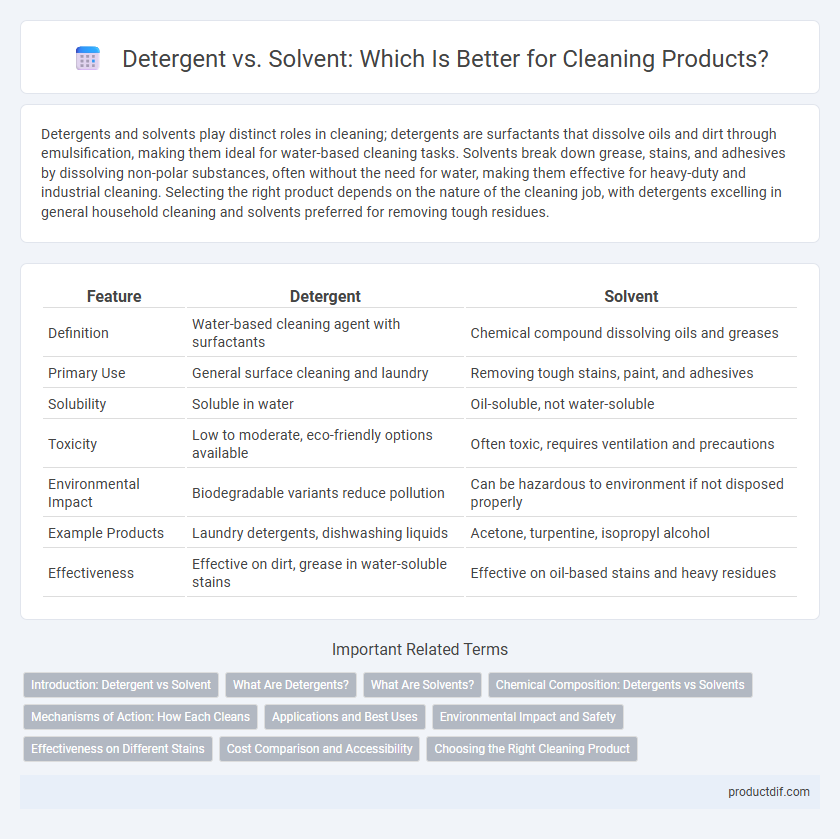Detergents and solvents play distinct roles in cleaning; detergents are surfactants that dissolve oils and dirt through emulsification, making them ideal for water-based cleaning tasks. Solvents break down grease, stains, and adhesives by dissolving non-polar substances, often without the need for water, making them effective for heavy-duty and industrial cleaning. Selecting the right product depends on the nature of the cleaning job, with detergents excelling in general household cleaning and solvents preferred for removing tough residues.
Table of Comparison
| Feature | Detergent | Solvent |
|---|---|---|
| Definition | Water-based cleaning agent with surfactants | Chemical compound dissolving oils and greases |
| Primary Use | General surface cleaning and laundry | Removing tough stains, paint, and adhesives |
| Solubility | Soluble in water | Oil-soluble, not water-soluble |
| Toxicity | Low to moderate, eco-friendly options available | Often toxic, requires ventilation and precautions |
| Environmental Impact | Biodegradable variants reduce pollution | Can be hazardous to environment if not disposed properly |
| Example Products | Laundry detergents, dishwashing liquids | Acetone, turpentine, isopropyl alcohol |
| Effectiveness | Effective on dirt, grease in water-soluble stains | Effective on oil-based stains and heavy residues |
Introduction: Detergent vs Solvent
Detergents are surfactant-based cleaning agents that emulsify grease and dirt, making them soluble in water for easy rinsing. Solvents are chemical substances that dissolve oily stains and residues without water, often used for heavy-duty or industrial cleaning. Understanding the difference between detergent and solvent helps optimize cleaning efficiency for various surfaces and contamination types.
What Are Detergents?
Detergents are surfactant-based cleaning agents designed to remove dirt, oils, and grease by emulsifying them in water for easy rinsing. Unlike solvents, which dissolve substances without mixing with water, detergents work through micelle formation to lift and suspend contaminants. Their effectiveness in various water conditions makes them essential in household and industrial cleaning applications.
What Are Solvents?
Solvents are chemical substances that dissolve, suspend, or extract other materials without changing their chemical structure, making them essential in cleaning products for breaking down oils, grease, and adhesives. Unlike detergents, which rely on surfactants to lift dirt and particles from surfaces, solvents work by dissolving contaminants directly, enhancing the effectiveness of stain removal. Common solvents in cleaning products include alcohols, acetone, and turpentine, each suited for specific cleaning applications based on their polarity and evaporation rates.
Chemical Composition: Detergents vs Solvents
Detergents are primarily composed of surfactants that reduce surface tension and emulsify oils, salts, and polymers to remove dirt effectively. Solvents consist mainly of organic compounds such as alcohols, hydrocarbons, and esters, designed to dissolve grease, oils, and other hydrophobic substances by breaking chemical bonds. The fundamental chemical difference lies in detergents' amphiphilic molecules versus solvents' ability to solvate nonpolar compounds through molecular interactions.
Mechanisms of Action: How Each Cleans
Detergents clean by reducing surface tension, allowing water to penetrate and emulsify dirt and grease, encapsulating oily grime into micelles for easy rinsing. Solvents work by dissolving non-polar substances like grease and oils through chemical interactions, breaking down and dispersing contaminants that water alone cannot remove. The choice between detergent and solvent depends on the nature of the soil and the cleaning surface, with detergents excelling in water-based cleaning and solvents in tackling tough, oily residues.
Applications and Best Uses
Detergents are ideal for cleaning everyday household items, fabrics, and greasy surfaces by emulsifying dirt and oils in water, making them effective for laundry, dishwashing, and general surface cleaning. Solvents excel in dissolving stubborn stains, adhesives, and waxes, commonly used in industrial cleaning, paint removal, and degreasing metal parts. Selecting detergents or solvents depends on the nature of the material being cleaned and the type of residue, with detergents suited for water-soluble grime and solvents for non-polar contaminants.
Environmental Impact and Safety
Detergents typically contain biodegradable surfactants that break down safely in water, minimizing environmental toxicity compared to solvents, which often include volatile organic compounds (VOCs) contributing to air pollution and hazardous waste. Solvents can pose significant health risks such as respiratory irritation and skin sensitization due to their chemical volatility and flammability. Choosing biodegradable detergents reduces ecological damage and enhances user safety by eliminating harmful emissions and toxic residues.
Effectiveness on Different Stains
Detergents excel at removing water-based stains such as dirt, food, and grease by breaking down oils and suspending particles in water for easy rinsing. Solvents are more effective on stubborn, oil-based stains like ink, paint, and tar due to their ability to dissolve non-polar substances that detergents cannot. Selecting the appropriate cleaning agent depends on the stain composition and the surface material to maximize stain removal efficiency.
Cost Comparison and Accessibility
Detergents generally offer a more cost-effective solution for everyday cleaning tasks due to their widespread availability in supermarkets and affordability in bulk purchasing. Solvents, often used for specialized cleaning applications, tend to be more expensive and less accessible, typically sold through industrial suppliers or specialty stores. Consumers seeking budget-friendly and easily obtainable cleaning products usually prefer detergents over solvents for regular household use.
Choosing the Right Cleaning Product
Choosing the right cleaning product depends on the type of stain and surface material; detergents excel at removing dirt and grease from fabrics and hard surfaces through surfactants that break down oils. Solvents dissolve specific substances such as paint, ink, or adhesive residues but may damage sensitive surfaces or fabrics if used improperly. Assess cleaning needs carefully and consult product labels to select a detergent for general cleaning or a solvent for targeted stain removal.
Detergent vs Solvent Infographic

 productdif.com
productdif.com